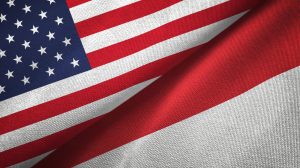In April 2023, the United States government introduced guidance for the $7,500 tax credit for the purchase of each electric vehicle (EV) under the Inflation Reduction Act (IRA) 2022. To be eligible for half of the credit, a portion of the “critical minerals” used in the EV’s battery must come from a country with which the U.S. has a free trade agreement (FTA). The remaining half of the credit necessitates a specific percentage of battery components to be manufactured or assembled in North America.
Indonesia, the world’s largest nickel producer, has been pursuing an FTA with the United States on critical minerals, especially nickel. Japan signed a similar agreement with the United States in March 2023, allowing its automotive industry to benefit from the EV tax credit. Such an FTA could give Indonesian firms in the EV battery supply chain access to the growing EV market in the U.S., benefiting from the IRA’s tax credits.
Those hopes received a blow on October 24, when a bipartisan group of nine U.S. senators sent a letter to the U.S. Trade Representative and well as the secretaries of Treasury, Energy, and Commerce. The senators expressed reservations about striking a limited FTA with Indonesia, which would allow Indonesian critical minerals to benefit indirectly from the subsidies scheme under the IRA.
The senators’ primary argument is that granting Indonesia an FTA would provide a backdoor for Chinese corporations, and U.S. taxpayers should not be subsidizing Chinese miners in Indonesia. Their concerns also extend to Indonesia’s labor rights, environmental protection, safety, and human rights standards.
The senatorial views could influence the stance of the U.S. Congress and government regarding an Indonesia-U.S. limited FTA on critical minerals. Most likely, their perspectives will be included among the contentious issues raised by the United States during FTA negotiations.
The IRA criteria prevent EVs with components from “foreign entities of concern,” including China, from receiving the EV tax credits. This is a barrier for Indonesia because Chinese investments have dominated the country’s nickel downstreaming through joint ventures and co-ownership.
The senators’ letter noted that Indonesia has three plants able to produce 164,000 metric tons/year of Mixed Hydroxide Precipitate (MHP), a nickel intermediate for EVs batteries, with plans for over 25 more such plants. “All but three” of those projects involve Chinese companies, the letter said.
Meanwhile, the senators expressed concern for labor rights, environmental protection, safety, and human rights standards in Indonesia’s mining industry. Indeed, poor working conditions, for instance, are suffered by both Indonesian and Chinese workers, as exposed in a recent ABC News report. Unions, a mining watchdog, and other non-government organizations in Indonesia have been sounding the alarm on worker rights and safety issues for several years.
Another concern is Indonesia’s mineral trade restrictions, which include export bans on nickel ore since 2020, and then bauxite ore this year. These restrictions run counter to the free trade principles and the U.S. standards of limited FTAs as represented in the U.S.-Japan Critical Minerals Agreement.
The agreement offers Japanese companies potential access to the United States’ EV tax credit by ensuring eligibility and easing restrictions on the import of critical minerals – lithium, graphite, manganese, cobalt, and nickel – between the two countries. Both countries commit to uphold their World Trade Organization (WTO) obligations, prevent import and export restrictions on critical minerals, refrain from imposing export duties on such minerals, and accord national treatment to each other’s critical minerals.
Indonesia may defend its export bans by arguing that it is awaiting the WTO’s final ruling in its dispute with the European Union concerning these bans. A compromise on Indonesia’s raw minerals exports to the United States should be on the table of the FTA talks. Considering Indonesia’s persistence on preserving export bans as one of its core industrialization policies, however, such a compromise would be difficult for Jakarta to take.
The Indonesian proposal for an OPEC-like cartel for critical minerals is also troublesome. Free trade implies doing trade with the least barriers, while a cartel is a group of producers colluding to create barriers by controlling supply or prices. The proposal has impaired Indonesia’s trade policy reputation before its trading partners, including the United States, and hence must be withdrawn.
The senators’ letter also emphasizes that the United States and its allies, like Australia and Canada, are scaling domestic nickel production. These countries are focusing on high environmental and labor standards, efficient waste management, lower carbon emissions, and extensive stakeholder engagement, ensuring community engagement.
The senators are clear that countries with better environmental, social, and governance (ESG) practices in nickel production are the preferable sources. They close their letter by arguing that “eligibility for the critical minerals credit must prioritize domestic producers and existing free trade agreement partners. If expansion is deemed necessary, it should be directed toward countries with strong labor, human rights, and environmental standards.”
The senators’ letter is a wake-up call for Indonesia. Being the world’s leading nickel producer is not enough to secure an FTA with the United States. This underlines the urgency to show concrete actions with strong evidence of upgrading ESG mining practices in Indonesia. A careful review of Indonesia’s minerals trade restriction might also be necessary. Better ESG practices and an improved investment climate in mining would lure investment from countries other than China.

































